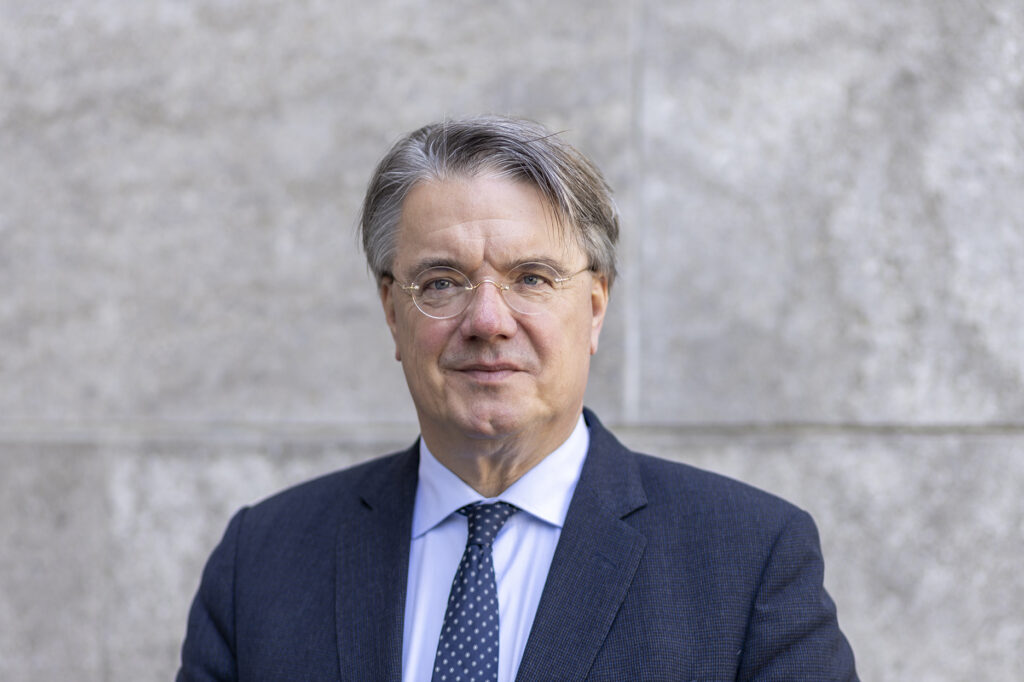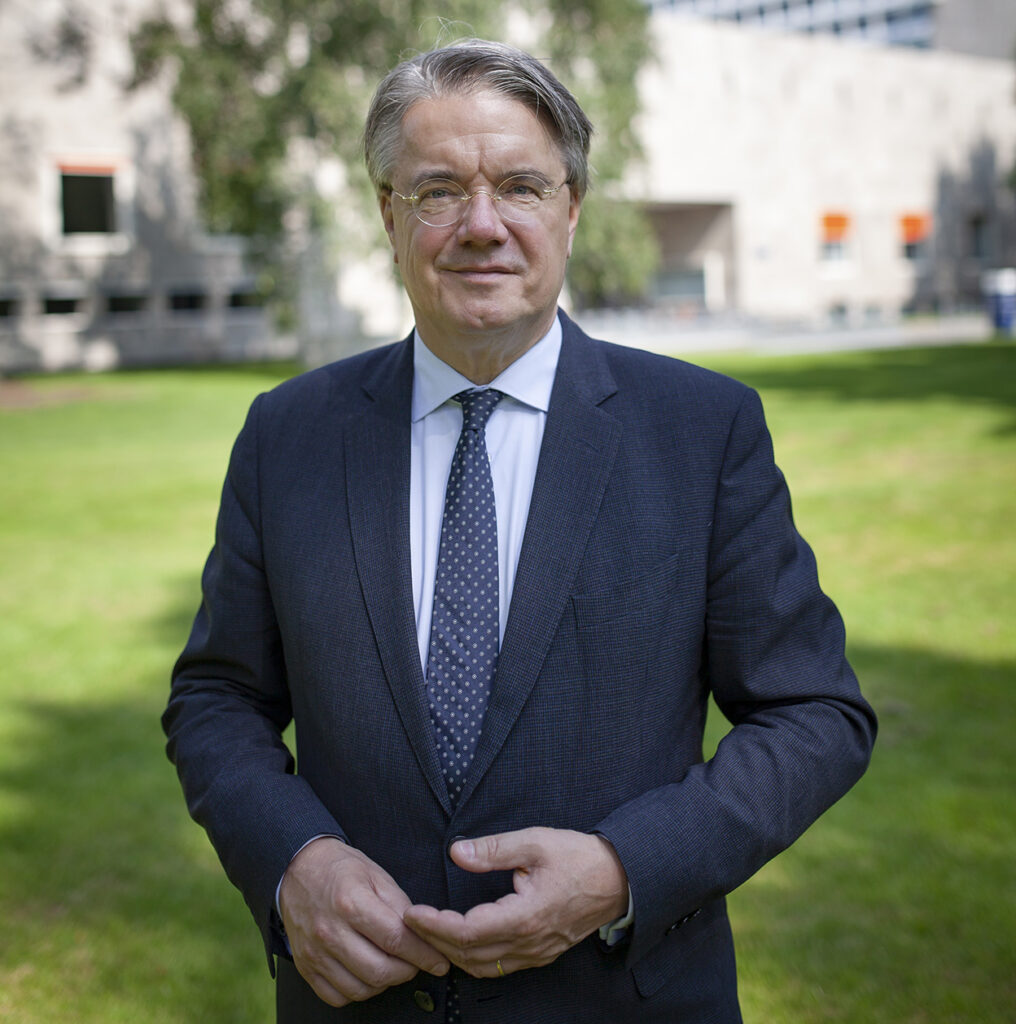Wim van de Donk: ‘The perverse incentive is the real problem, not internationalization’
Fewer international students at the university? After the elections, it will become clear how hard The Hague will steer towards this. According to Rector Magnificus and university President Wim van de Donk, the international character is essential for universities. ‘Reform the funding model, that’s where the pain is.’

Did he read a good book during the summer vacation? If Wim van de Donk admires anyone, it is the Dutch humanist Desiderius Erasmus. He enjoyed reading the biography Sandra Langereis wrote about him. Van de Donk: ‘Erasmus made long and far journeys through Europe to gain and exchange knowledge.’
By which he just wants to say: good research and good education have always benefited from international connections. Universities cannot do without them. Plurality of voices, polyphony: that characterizes academia. ‘The university is a place where diverse visions, disciplines, and cultures meet. That openness and freedom are indispensable. Only then will tomorrow’s ideas emerge.’
That is also why Van de Donk is pleased to have joined the Board of the European University Association (EUA). This organization represents more than 850 universities and stimulates knowledge exchange across borders. The EUA also makes its voice heard in Brussels in order to influence European policy on higher education, research, and innovation.
‘A great vantage point for the future and for representing the interests of Europe and internationalization for education and research,’ Van de Donk says.
Not being afraid of The Hague
And in that future, quite a lot is about to happen. After the national elections in November, it will become clear to what extent Education Minister Dijkgraaf’s plans to curb the intake of international students will gain a foothold. A development that Van de Donk is obviously following closely, but not with fear.
‘It’s about a good balance and that’s what we want to discuss and think about. Of course Europe is important, that goes without saying, but you cannot lose the connection with your own region. Even local students who don’t tick the seven checkmarks should feel welcome at our university. And collaboration with young entrepreneurs and the clustering of universities in regional ecosystems leads to stronger economies.’
Van de Donk is adamant about one thing: wanting to curb the intake of international students to control the growth of universities is nothing more than combatting the symptoms. ‘The real problem is the current funding model, which poisons the relationships.’
Perverse incentive
Government funding of universities, how does that work again? Universities receive steady funding and variable funding from the government. The variable funding is largely dependent on the number of students per university, but the number of PhDs also counts, for example. And that creates a rat race between universities.
You can’t stand still as a university because if other universities grow in numbers and you don’t, your market share gets smaller, and you don’t receive additional funding despite additional work. After all, the available budget does not grow proportionally. Growth thus becomes the driving force, with all its consequences: increased workload, housing problems, and a poor student-lecturer ratio.
Continue reading after the image.

‘Therefore, tackle the perverse incentive for growth,’ says Van de Donk. ‘Then you really change structurally. Wanting to curtail the number of international students, disregarding the international character of universities, does not reflect a well-thought-out, long-term vision.’
Soft boundaries
Van de Donk argues for ‘soft boundaries.’ He refers to the civic university, a concept of Emeritus Professor of Regional Development Studies John Goddard. By making its own boundaries softer, both externally and internally, a university can collaborate better in a multidisciplinary and interdisciplinary way. Also with outside parties.
Van de Donk likes to compare the university to a seaport, as he did in his 2023 Willem Witteveen lecture. A seaport is internationally and regionally connected, a place where all kinds of different ships dock and depart again and where choices are constantly being made at different levels. ‘That is why, at Tilburg University, we now have the academic collaborative centers. Here we collaborate in an interdisciplinary way, with companies, governments, and other knowledge institutions on themes such as climate and energy transition or the labor market. In this way, we want to contribute to what we call ‘wellbeing’ for all.’
Engaged members
Keep meeting each other, creating new and unexpected combinations. That remains the common thread for Van de Donk, even on the campus itself. The coronavirus period has accelerated the digitalization of education. But the interactions between student and lecturer and students among themselves, remain of great importance, according to the Rector Magnificus.
‘We don’t want to be a Thuisbezorgd.nl educational institution. Students are not consumers; they are engaged members of our academic community. One’s time as a student is the period when encounters are essential. To that end, a vibrant and multi-voiced campus remains paramount.’
Continue asking
In addition to the focus on people and society, digitalization has become indispensable at Tilburg University. It is all about the combination between digital sciences and high-quality knowledge of economics, business sciences and entrepreneurship, social and behavioral sciences, law and public administration, humanities, and theology.
In this regard, new technological developments both offer opportunities as well as pose challenges, but they are not all negative. Van de Donk is reminded of a ‘conversation’ he had with AI program ChatGPT. ‘I wanted to know where the term ‘ivory tower’ came from, an expression often used to describe the complacent isolation of intellectuals.’
ChatGPT came up with, among other things, a passage from the Biblical Song of Songs. And with the name of a certain Charles-Augustin Saint-Beuve, who helped develop the idea of the ivory tower into the contemporary reference to intellectuals cut off from society.
Van de Donk: ‘But when I kept asking for referrals and asked whether I could trust the program, ChatGPT started avoiding me. The program asked me to talk about something else, while more and more errors crept into the answers.’ Eventually, the program even requested that the conversation cease.
The Rector Magnificus considers this amusing. ‘ChatGPT is only going to increase the need to continue asking questions. Similarly, our dialogue with new technology will only make us more critical and invite us to think things through.’
During the Opening of the Academic Year on Monday, September 4, with the theme ‘The Art of Digitalization,’ the opportunities and challenges of digitalization were also discussed.
Translated by Language Center, Riet Bettonviel






